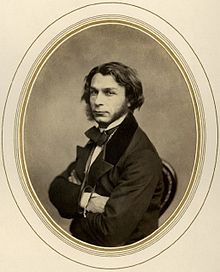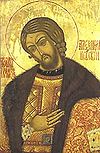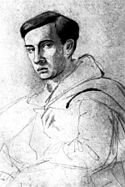- Dmitry Grigorovich
-
Dmitry Grigorovich 
Born March 31, 1822
Simbirsk, RussiaDied January 3, 1900 (aged 77)
St. Petersburg, RussiaPeriod 1840s-1890s Genres Fiction, criticism, travel writing Subjects Social issues Notable work(s) The Fishermen Dmitry Vasilyevich Grigorovich (Russian: Дми́трий Васи́льевич Григоро́вич) (March 31 [O.S. March 19] 1822, Simbirsk - January 3 1900 [O.S. December 22, 1899], Saint Petersburg) was a Russian writer, artist, and art critic.
Contents
Early life
Grigorovich was born in Simbirsk, where his family were members of the landed gentry. His father was Russian and his mother French.[1] From 1832 to 1835 he studied at several French and German private schools in Moscow. He then did coursework at the Nikolayev Engineering Institute, where he made friends with his fellow student Fyodor Dostoyevsky, and the Imperial Academy of Arts until 1840. Grigorovich said that it was through his friendship with Dostoyevsky that he first became interested in literature.[2][3]
Career
 Contributors to Sovremennik: Grigorovich (top center) next to Leo Tolstoy, Bottom row: (from left) Goncharov, Turgenev, Druzhinin, and Ostrovsky. Photograph by Sergey Levitsky, 1856.
Contributors to Sovremennik: Grigorovich (top center) next to Leo Tolstoy, Bottom row: (from left) Goncharov, Turgenev, Druzhinin, and Ostrovsky. Photograph by Sergey Levitsky, 1856.
Upon leaving school, Grigorovich took a small room from the warder of the Academy of Arts. It was in the neighboring studios that he made his first literary acquaintances including Nikolay Nekrasov, who published Grigorovich's earliest work St. Petersburg Organ Grinders (1845). Nekrasov also introduced him to the influential critic Vissarion Belinsky.[3]
In the mid-1840s Grigorovich renewed his friendship with Dostoyevsky after a chance meeting in the street. They soon moved in together. In 1846 Dostoyevsky read his first novel Poor Folk to Grigorovich, who was so impressed by the reading that he took the manuscript to Nekrasov, who soon published it.[3]
1846 also saw the publication of Grigorovich's short novel The Village, influenced by his reading of Dickens's Oliver Twist. The Village, and his 1847 novel Anton Goremyka ('Luckless Anton') were both published in the influential magazine Sovremennik. The realistic treatment of peasant life in these two novels was praised by Belinsky, and by the writer Shchedrin, among others, and had a considerable impact on the writing of that period. Grigorovich's fame was soon eclipsed, though, by the publication of Ivan Turgenev's A Sportsman's Sketches.[2][4]
In 1858 and 59, Grigorovich took part in a literary expedition organized by Grand Duke Konstantin, along with other writers such as Alexander Ostrovsky and Ivan Goncharov. Grigorovich described his travels to the Mediterranean as a part of this expedition in his book The Ship Retvizan.[2]
Later life
 Portrait of Grigorovich by Ivan Kramskoy, 1876.
Portrait of Grigorovich by Ivan Kramskoy, 1876.
As a result of the political tensions of the 1860s and 70s, Grigorovich turned away from literature, returning to it only in the 1880s.[2] In 1862 he travelled to London to study English art at the 1862 International Exhibition and in other galleries. In 1863 he published an account of his studies, Paintings by English Artists at London Exhibitions in 1862, in the Russian Herald. The article was significant both for providing the most comprehensive analysis of British painting yet to appear in the Russian press, and for Grigorovich's comments on the merits of British painting in comparison with those of other European schools. He especially liked the works of William Holman Hunt.[5]
In 1886 he wrote his celebrated letter to the young writer Anton Chekhov, telling him that he had a gift, and that he should take his literary efforts more seriously. In his reply Chekhov said: "Your letter, my kind, fervently beloved bringer of good tidings, struck me like a flash of lightning. I almost burst into tears, I was overwhelmed, and now I feel it has left a deep trace in my soul." [6][7]
Grigorovich died in St. Petersburg in 1900.
Notes
English Translations
- The Cruel City, (Novel-1855/56), Cassell Publishing Company, 1891. from Google Books
- The Peasant, (Short Novel), from Russian Sketches, Smith Elder & Co, 1913. from Archive.org
- The Fishermen, (Novel-1853), Stanley Paul and Co, 1916. from Archive.org
References
- ^ Russian Literature, Peter Kropotkin (New York: McClure, Phillips & Co. 1905).
- ^ a b c d , Handbook of Russian Literature, ed. Victor Terras, (New Haven: Yale University Press, 1990).
- ^ a b c , Reminiscences of Grigorovich, from Letters of F.M. Dostoyevsky to His Family and Friends (New York: Macmillan).
- ^ The Cambridge History of Russian Literature, ed. Charles A. Moser (Cambridge University Press, 1992).
- ^ English Accents: Interactions with British Art, c. 1776-1855, Ashgate Publishing, 2004.
- ^ Letters of Anton Chekhov to His Family and Friends, ed. Constance Garnett (London: Chatto and Windus, 1920).
- ^ Anton Chekhov: A Life in Letters (Penguin Classics, 2004).
People from Russia Leaders and religious - Pre-1168
- 1168–1917
- 1922–1991
- 1991–present
- RSFSR leaders
- General secretaries
- Soviet premiers (1st deputies)
- Soviet heads of state (and their spouses)
- Prime ministers (1st deputies)
- Foreign ministers
- Prosecutors general
- Metropolitans and patriarchs
- Saints

Military and explorers - Field marshals
- Soviet marshals
- Admirals
- Aviators
- Cosmonauts
Scientists and inventors - Aerospace engineers
- Astronomers and astrophysicists
- Biologists
- Chemists
- Earth scientists
- Electrical engineers
- IT developers
- Linguists and philologists
- Mathematicians
- Naval engineers
- Physicians and psychologists
- Physicists
- Weaponry makers
Artists and writers Sportspeople - Chess players
Categories:- Russian novelists
- 1822 births
- 1900 deaths
- Russian artists
- Russian art critics
- Russian travel writers
- People from Ulyanovsk
Wikimedia Foundation. 2010.

